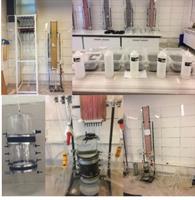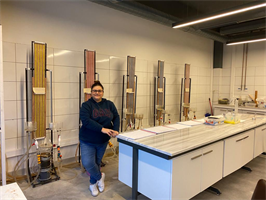In today's world, beneficial reuse of industrial by-products in civil engineering applications is of significant importance. For our developing country, highway constructions are a valuable one of those applications. In particular, use of industrial by-products in highway drainage systems as an alternative material for natural aggregate is a popular research topic. In this study, industrial byproducts with different physical and chemical characteristics have been subjected to an extensive laboratory testing program to determine the physical impacts when used in highway drainage systems for filtration purposes.
You can find the detailed explanation about the project, coordinated by Assist. Prof. Dr. Aslı Dayıoğlu, below.


Project Title: Utilization of industrial by-products in highway drainage systems : An experımental study
Project Type: İTÜ BAP - Genel Araştırma Projesi
Project Coordinator: Assist. Prof. Dr. Aslı Dayıoğlu
Abstract:
In today's world, beneficial reuse of industrial by-products in civil engineering applications is of significant importance. For our developing country, highway constructions are a valuable one of those applications. In particular, use of industrial by-products in highway drainage systems as an alternative material for natural aggregate is a popular research topic. In this study, industrial byproducts with different physical and chemical characteristics have been subjected to an extensive laboratory testing program to determine the physical impacts when used in highway drainage systems for filtration purposes. In order to investigate primarily the clogging mechanism when used for filtration, long term filtration tests have been conducted to evaluate the clogging behavior of the drainage system consisting of the aggregate/industrial byproduct and geotextile. The experiment system described in ASTM D 5101 has been slightly modified and the new system was manufactured accordingly. The gradient ratio (GR) and the permeability ratio (KR) , the two parameters defining the clogging performance of an aggregate/geotextile system have been determined under various hydraulic gradients. Furthermore, the effect of material type on clogging mechanism was physically investigated and the results were discussed.